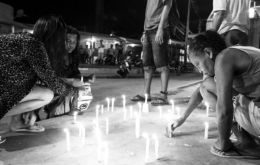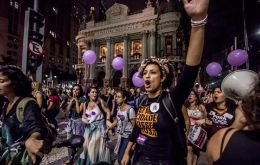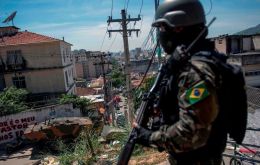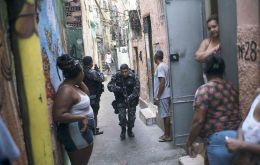MercoPress. South Atlantic News Agency
Tag: Brazil violence
-
Saturday, February 15th 2020 - 09:05 UTC
Bolsonaro celebrates crime index falls to its lowest level in more than a decade

Brazilian President Jair Bolsonaro celebrated Friday after a crime index showed homicides fell to their lowest level in more than a decade during the first year of his term.
-
Thursday, November 8th 2018 - 06:55 UTC
Brazil future Justice minister Moro pledges to fight organized crime and corruption

The judge who is the most prominent face of Brazil's anti-corruption campaign denied that his appointment as justice minister was a reward for having convicted and jailed a political rival of his new boss.
-
Wednesday, October 31st 2018 - 12:47 UTC
Bolsonaro in favour of the right to bear arms

Brazil's President elect Jair Bolsonaro has vowed to push for a change in the current legislation which requires people to justify their need to carry a weapon in order to be given the mandatory license.
-
Friday, August 10th 2018 - 06:36 UTC
Another record year of murders in Brazil: 63.880 in 2017

Brazil had a record number of murders last year, with homicides rising 3.7% from 2016 to 63,880 according to a study released on Thursday, just months before a presidential election in which violence has become a key issue.
-
Friday, March 16th 2018 - 09:36 UTC
Rio's military intervention questioned following the killing of a popular councilor and activist

Crying, chanting and screaming in anger, thousands gathered in front of the Rio de Janeiro state legislature on Thursday to say goodbye to a black city councilwoman shot in the head four times, a brazen murder that shocked Brazil and raised questions about the effectiveness of a military intervention in the country's second biggest city.
-
Wednesday, February 21st 2018 - 09:27 UTC
“What a shot”, the folklore side of rampant violence in Rio do Janeiro favelas

A viral music video called “What a shot” is stirring debate in Brazil about the glamorization of crime and freedom of expression, as surging crime in Rio de Janeiro has led the government to put troops in charge of security in the tourist city. The hit by Jordana Gleise de Jesus Menezes - known as JoJo Todynho - has spawned myriad parody videos on YouTube since it was released in December.
-
Tuesday, February 20th 2018 - 09:48 UTC
Brazilian Army law and order experience in Rio, is tempting other states

Brazilian leaders said on Monday that the use of the military to combat rising violence in Rio de Janeiro could serve as a model for other violent areas of Brazil. The armed forces officially took over Rio’s police on Friday under a decree signed by president Michel Temer. The measure still requires congressional approval, and the lower house was to debate it late Monday.
-
Saturday, February 17th 2018 - 09:42 UTC
Temer has Rio do Janeiro under full military control to combat gang violence

Brazil's President Michel Temer on Friday handed the military full control of security in Rio de Janeiro in an increasingly desperate fight to tame runaway gang violence. Army patrols are already used in Rio's gang-ruled favelas, but a decree signed by Temer will now give the military full control of security operations in Rio state, which the president said had virtually been seized by organized crime gangs.
-
Thursday, January 11th 2018 - 10:11 UTC
US, via Paraguay, largest source of guns entering Brazil

The United States is the largest source of guns entering Brazil that end up in the hands of armed bandits and drug traffickers, according to a Brazilian Federal Police report. Roughly 1,500 guns originated in the United States out of a study of more than 10,000 arms seized by police since 2014, mostly in Rio de Janeiro, the December 2017 report said, although the guns often traveled through a third country before arriving in Brazil.
